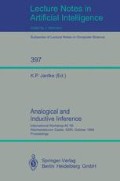Abstract
Explanation-based learning is using the same technique as partial evaluation, namely unfolding. However, it brings a new insight: an example can be used to guide the transformation process. In this paper, we further explore this insight and show how examples can be used to guide other kinds of program transformation, guiding not only the unfolding, but also the introduction of new predicates and the folding. On the other hand, we illustrate the more fundamental restructuring which is possible with program transformation and the relevance of completeness results to eliminate computationally inefficient knowledge.
Supported by the Belgian National Fund for Scientific Research.
Supported by the Belgian I.W.O.N.L.-I.R.S.I.A. under contract number 5203.
Preview
Unable to display preview. Download preview PDF.
References
Bird R.S., Tabulation techniques for recursive programs, ACM Computing Surveys, Vol.12, No.4, 1980, pp.:403–417.
Bruynooghe M., A practical framework for the abstract interpretation of logic programs, Journal Logic Programming, 1989, to appear.
Bruynooghe M., De Schreye D. and Krekels B., Compiling Control, in Proc. Third International Symposium on Logic Programming, 1986, pp.70–78.
Bruynooghe M., De Raedt L., De Schreye D., Explanation-based program transformation, in Proc. International Joint Conf. Artificial Intelligence (IJCAI89), 1989, to appear.
Bruynooghe M., De Schreye D. and Krekels B., Compiling Control, Journal Logic Programming, 1989, pp: 135–162.
Burstall R.M., Darlington J., A transformation system for developing recursive programs, JACM, 24, 1977, pp. 44–67.
Chang C., Lee R.C., Symbolic Logic and Mechanical Theorem Proving, Academic Press Inc., 1973.
Debray S.K. Warren, D.S., Detection and optimisation of functional computations in Prolog, in Proc. Third International Logic Programming Conference, LNCS Vol.225, Springer Verlag, 1986, pp. 490–504.
Debray S.K., Unfold/fold transformations and loop optimisation of Logic Programs, in Proc. SIGPLAN'88 Conf. on Programming Language Disign and Implementation, SIGPLAN Notices, Vol.23, No.7, July 1988, pp. 297–307.
DeJong G., Some thoughts on the present and future of explanation-based learning, in Proc. European Conf. on Artificial Intelligence, (ECAI88), 1988, pp. 690–698.
DeJong G., Mooney R., Explanation-based learning: an alternative view, Machine Learning, Vol.1, No.2, 1986, pp. 145–176.
De Schreye D., Bruynooghe M, On the transformation of logic programs with instantiation based computation rules, J.Symbolic Computation, 1989, pp:125–154.
De Schreye D., Bruynooghe M., An application of abstract interpretation in source level program transformation, in Programming Language Implementation and Logic Programming, Deransart, Lorho, Maluszynski, eds., LNCS 348, Springer-Verlag, 1989, pp. 35–58.
Feather M.S., A system for assisting program transformation, ACM Trans. Prog. Lang. and Systems 4, 1, Jan. 1982, pp. 1–20.
Gregory S., Towards the compilation of annotated logic programs, Res.Report DOC80/16, June 1980, Imperial College.
Kedar-Cabelli S.T., McCarthy L.T., Explanation based generalization as resolution theorem proving, in Proc. of the 4th International Workshop on Machine Learning, Irvine, Morgan Kaufmann, 1987, pp. 383–389.
Komorowski H.J., A specification of an abstract Prolog machine and its applications to partial evaluation, Linkoping Studies in Science and Technology, Dissertation No.69, Linkoping University, 1981.
Kowalski R.A., Logic for problem solving, North-Holland, 1979.
Mitchell T.M., Keller R.M., Kedar-Cabelli S.T., Explanation-based generalization: a unifying view, Machine Learning, Vol.1, No.1, 1986, pp. 47–80.
Proietti M., Pettorossi A., Some strategies for transforming logic programs, report Istituto di Analisi dei Sistemi ed Informatica, Rome, 1988.
Sablon G., De Raedt L., Bruynooghe M., Generalizing multiple examples in explanation-based learning, in Proc. of International Workshop on Analogical and Inductive Inference, (AII89), LNCS, Springer-Verlag, to appear.
Sato T., Tamaki H., Transformational logic program synthesis, FGCS '84, Tokyo, 1984.
Shavlik J., DeJong G., BAGGER: an EBL system that extends and generalizes explanations, in Proc. of the Sixth National Conference on Artificial Intelligence, 1987, pp. 516–520.
Shavlik J., DeJong G., An explanation-based approach to generalizing number, in Proc. of the tenth International Joint Conference on Artificial Intelligence, Morgan Kaufmann, Milano, 1987, pp. 236–238.
Tamaki H., Sato T., Unfold/fold transformations of logic programs, in Proc. Second International Conference on Logic Programming, 1984, pp. 127–138.
Van Harmelen F., Bundy A., Explanation Based Generalization = Partial Evaluation, Artificial Intelligence, Vol.36, No.3, 1988, pp. 401–412.
Venken R., A Prolog Meta-interpreter for partial evaluation and its applications to source to source transformation and query-optimisation, in Proc. of the 6th. ECAI, 1984, pp.:91–100.
Wadler P., Listlessness is better than laziness, lazy evaluation and garbage collection at compile-time, in Proc.ACM Symp. on Lisp and Functional Programming, 1984, pp. 45–52.
Wadler P., Listlessness is better than laziness II: composing listless functions, in Proc. Conf. on Programs as data objects, Gansinger and Jones, eds., LNCS, Springer-Verlag, 1985.
Wadler P., Deforestation: transforming programs to eliminate trees, in Proc. Second European Symposium on Programming (ESOP88), ed. Gansinger, LNCS, Springer-Verlag, 1988, pp. 344–358.
Author information
Authors and Affiliations
Editor information
Rights and permissions
Copyright information
© 1989 Springer-Verlag Berlin Heidelberg
About this paper
Cite this paper
Bruynooghe, M., De Schreye, D. (1989). Some thoughts on the role of examples in program transformation and its relevance for explanation-based learning. In: Jantke, K.P. (eds) Analogical and Inductive Inference. AII 1989. Lecture Notes in Computer Science, vol 397. Springer, Berlin, Heidelberg. https://doi.org/10.1007/3-540-51734-0_52
Download citation
DOI: https://doi.org/10.1007/3-540-51734-0_52
Published:
Publisher Name: Springer, Berlin, Heidelberg
Print ISBN: 978-3-540-51734-4
Online ISBN: 978-3-540-46798-4
eBook Packages: Springer Book Archive

